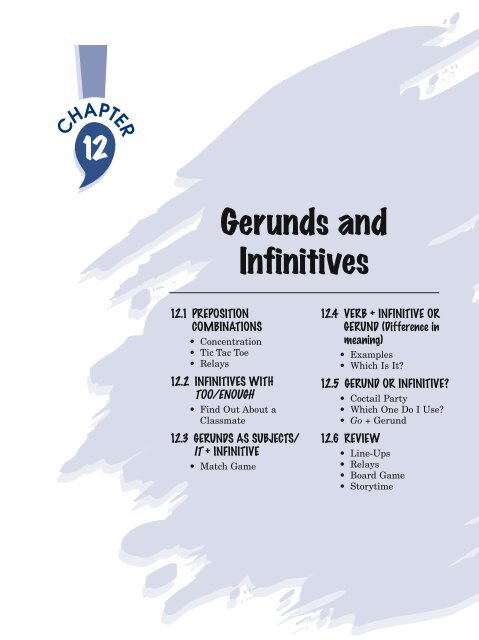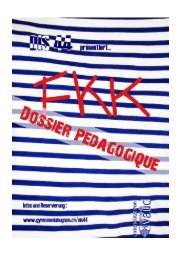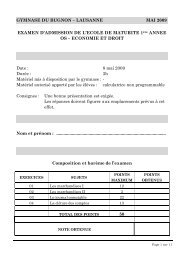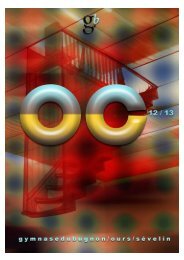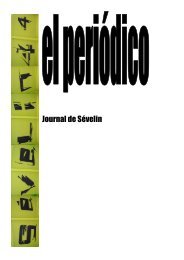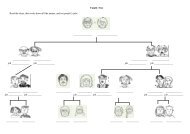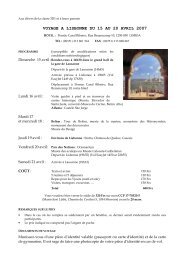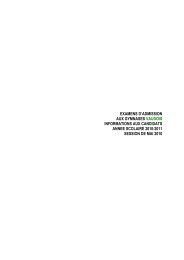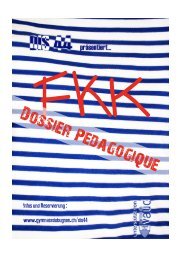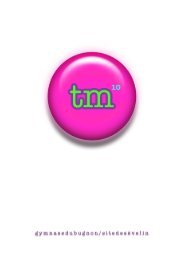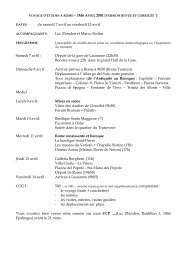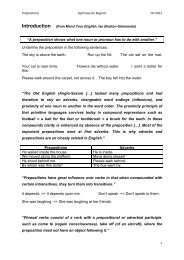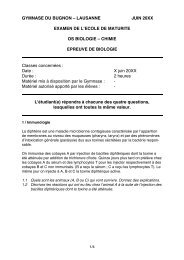Chapter 12âGerunds and Infinitives - AzarGrammar.com
Chapter 12âGerunds and Infinitives - AzarGrammar.com
Chapter 12âGerunds and Infinitives - AzarGrammar.com
You also want an ePaper? Increase the reach of your titles
YUMPU automatically turns print PDFs into web optimized ePapers that Google loves.
12<br />
Gerunds <strong>and</strong><br />
<strong>Infinitives</strong><br />
12.1 PREPOSITION<br />
COMBINATIONS<br />
• Concentration<br />
• Tic Tac Toe<br />
• Relays<br />
12.2 INFINITIVES WITH<br />
TOO/ENOUGH<br />
• Find Out About a<br />
Classmate<br />
12.3 GERUNDS AS SUBJECTS/<br />
IT + INFINITIVE<br />
• Match Game<br />
12.4 VERB + INFINITIVE OR<br />
GERUND (Difference in<br />
meaning)<br />
• Examples<br />
• Which Is It<br />
12.5 GERUND OR INFINITIVE<br />
• Coctail Party<br />
• Which One Do I Use<br />
• Go + Gerund<br />
12.6 REVIEW<br />
• Line-Ups<br />
• Relays<br />
• Board Game<br />
• Storytime
12.1 PREPOSITION COMBINATIONS<br />
Materials:<br />
Dynamic:<br />
Time:<br />
1. CONCENTRATION<br />
Board <strong>and</strong> chalk or markers<br />
Groups<br />
20 minutes<br />
Procedure: 1. Draw a blank grid on the board with just the numbers in the<br />
spaces. Prepare a concentration grid with all words filled in for<br />
your use. Below is a possible example. Some prepositions will have<br />
to be repeated.<br />
1 interested 2 on 3 apologized 4 insist 5 for<br />
6 to 7 afraid 8 thank you 9 instead 10 about<br />
11 for 12 excited 13 in 14 start 15 in<br />
16 of 17 to 18 accustomed 19 fool 20 of<br />
2. Divide the class into groups of four or five. The groups take turns<br />
calling out two numbers as they try to make a match. As they call<br />
out the numbers, write the corresponding word in the appropriate<br />
square on the board. If they make a match, give the group a point<br />
<strong>and</strong> cross out the two words, but leave them on the board. If the<br />
words are not a match, erase the words <strong>and</strong> go to the next group.<br />
When a group makes a match, it gets an extra turn.<br />
3. When all matches have been made, the group with the most points<br />
wins.<br />
NOTE: The groups can discuss among themselves the numbers they<br />
want to call out, but cannot write down any numbers <strong>and</strong> words.<br />
Although they can talk together, you will accept an answer only<br />
from the student in the group you call upon.<br />
Materials:<br />
Dynamic:<br />
Time:<br />
2. TIC TAC TOE<br />
Board <strong>and</strong> chalk or markers<br />
Worksheet 71 for variation game<br />
Teams<br />
10 minutes<br />
Procedure: 1. Draw a tic tac toe grid on the board <strong>and</strong> fill in verbs or expressions<br />
that take prepositions, as indicated on the next page. Divide the<br />
class into two teams.<br />
227
e used stop me be responsible<br />
insist be capable look forward<br />
object talk be remembered<br />
2. The object is to fill in the preposition that follows each verb. A<br />
player on the first team goes to the board <strong>and</strong> fills in the word in<br />
the square of his/her choice, then sits down. The first player from<br />
the opposing team goes to the board. He/she has the choice of<br />
either <strong>com</strong>pleting another word or correcting what he/she thinks is<br />
someone else’s incorrect <strong>com</strong>pletion. The first team with three<br />
correct answers in a row, any direction, is the winner.<br />
Variation:<br />
Divide the class into groups of three. You can be<strong>com</strong>e the third person<br />
in a group of two, or, if one student is left over, make one team of four.<br />
Two students are the players in a group of three, <strong>and</strong> the third<br />
student is the judge, who may have his/her grammar book open to the<br />
list of preposition <strong>com</strong>binations. He/she decides if a player has filled in<br />
the correct word. (In a group of four there are two judges.) Distribute<br />
one worksheet to each group.<br />
After the first game, the students change roles so the judge be<strong>com</strong>es a<br />
player. Continue until all students have had a chance to be the judge.<br />
228<br />
Materials:<br />
Dynamic:<br />
Time:<br />
3. RELAYS<br />
Board <strong>and</strong> chalk or markers<br />
Teams<br />
10 minutes<br />
Procedure: 1. On the board, make lists of verbs <strong>and</strong>/or expressions that require a<br />
preposition. The two lists include the same words, but are<br />
arranged in different order.<br />
Example: interested responsible<br />
dream insist<br />
apologize apologize<br />
believe interested<br />
crazy<br />
worry<br />
responsible dream<br />
worry<br />
believe<br />
insist<br />
crazy<br />
2. Divide the students into two teams <strong>and</strong> have them line up on<br />
either side of the board. One member from each team <strong>com</strong>es to the<br />
board <strong>and</strong> adds the correct preposition to one of the words on the<br />
board. The students then quickly pass their chalk to the next
student in line. Succeeding players can either choose another word<br />
to add a preposition to or correct any incorrect answer written by<br />
one of his/her teammates.<br />
3. The first team to finish the list with all answers correct is the<br />
winner.<br />
12.2 INFINITIVES WITH TOO/ENOUGH<br />
Materials:<br />
Dynamic:<br />
Time:<br />
1. FIND OUT ABOUT A CLASSMATE<br />
Worksheet 72 or similar 3”x5” cards<br />
Whole class<br />
20 minutes<br />
Procedure: 1. Cut Worksheet 72 into cards <strong>and</strong> fill in the name of a student from<br />
the class in each blank, or make similar cards. Distribute a card to<br />
each student, making sure that he/she does not receive the card<br />
with his/her own name on it.<br />
2. Each student finds the classmate whose name is in the question<br />
on his/her card. The students ask <strong>and</strong> receive an answer to their<br />
questions <strong>and</strong> respond to the question being asked of them by the<br />
classmate who has the card with their name on it. (This will most<br />
likely not be the same person. Carlos may have the card with<br />
Rosa’s name on it, while Rosa has the card with Young’s name on<br />
it. This means Rosa will have to answer Carlos’ question <strong>and</strong> ask<br />
Young a question.)<br />
Example card:<br />
Student A asks Keiko:<br />
Keiko’s answer:<br />
What is Keiko too short to do<br />
What are you too short to do<br />
I am too short to play basketball.<br />
3. If they question another student but no one has asked a question<br />
of them, they should sit down <strong>and</strong> wait for a classmate to approach<br />
them with a question. This will avoid too much congestion in the<br />
classroom. If you have a large room, however, you may want the<br />
students to continue st<strong>and</strong>ing until they have both asked <strong>and</strong><br />
answered a question.<br />
4. When all students have finished, call on each student to read<br />
his/her question <strong>and</strong> provide the answer in a <strong>com</strong>plete sentence.<br />
Student A’s response to instructor:<br />
What is Keiko too short to do<br />
She is too short to play basketball.<br />
229
12.3 GERUNDS AS SUBJECTS/IT + INFINITIVE<br />
Materials:<br />
Dynamic:<br />
Time:<br />
1. MATCH GAME<br />
Worksheet 73 (two pages)<br />
Groups<br />
20 minutes<br />
Procedure: 1. Cut Worksheet 73 into cards, or make similar cards. Divide the<br />
class into groups of four. Distribute an even number of cards to<br />
each group. (If you have a large class, you will want to make up<br />
more cards.) Each group should receive at least eight. This may<br />
mean giving one or two groups one pair more than another (some<br />
groups may receive six cards while others receive eight) or<br />
eliminating extra cards from play.<br />
2. Each group makes as many matches as possible. The matches<br />
must be grammatically correct <strong>and</strong> logical. (It is sometimes<br />
possible for a group not to make any matches initially, although<br />
that is rare.)<br />
3. When a group can make no more matches, it goes to other groups<br />
to look for a trade. Important: Students cannot just take a card<br />
from a group; they must trade. A group does not have to trade a<br />
card just because another group wants it. Usually, two students<br />
stay with the matches to make trades, while the other two go to<br />
different groups to see if they can make trades. Usually the<br />
students split up the unmatched cards: the students staying to<br />
make trades keep some, <strong>and</strong> the students looking for matches take<br />
others.<br />
4. When one group has made all its matches <strong>and</strong> the students think<br />
they are correct, the game stops. One group member (or members<br />
taking turns) reads out the matches. The other groups vote to<br />
accept or reject each match. A match can be rejected because it is<br />
not grammatical or not logical.<br />
5. If all matches are accepted, the game is over <strong>and</strong> that team wins.<br />
If some matches were rejected, the play continues until another<br />
group feels it has made all its matches <strong>and</strong> they are accepted.<br />
230
12.4 VERB + INFINITIVE OR GERUND<br />
(Difference in meaning)<br />
1. EXAMPLES<br />
Materials:<br />
Dynamic:<br />
Time:<br />
Worksheets 74A <strong>and</strong> B<br />
Pairs<br />
30 minutes<br />
Procedure: 1. Give each student a copy of both worksheets.<br />
2. Have the students work with a partner to match the meanings to<br />
the sentences in Worksheet 74A. When everyone has finished, go<br />
over the worksheet. See which pair has the most correct answers.<br />
Ask the students at r<strong>and</strong>om to explain why they chose the<br />
answers they did.<br />
3. Have the pairs do Worksheet 74B. Call on several pairs for each<br />
question. This way, there will be a variety of answers <strong>and</strong>, in case<br />
one pair uses the incorrect form, several correct versions will have<br />
been provided.<br />
2. WHICH IS IT<br />
Materials: Worksheet 75<br />
Dynamic: Small groups<br />
Time: 15 minutes<br />
Procedure: 1. Arrange students in groups of three or four <strong>and</strong> give each group<br />
one copy of the worksheet.<br />
2. Read the following questions to the class one at a time. The<br />
students should decide together in their groups which choice on<br />
the worksheet to circle.<br />
1. In which case have gas prices risen too high for John<br />
2. In which case is Mary thinking back about what she did earlier<br />
that day<br />
3. In which case have I already told you something before I began<br />
the sentence<br />
4. In which case was the air conditioner only one of the options<br />
Thu tried<br />
5. In which case did Kim have a responsibility to do something<br />
231
3. Go over the correct answers by assigning one set of sentences to<br />
each group. Have the group act out the two sentences so that the<br />
answer to the question is obvious to all.<br />
12.5 GERUND OR INFINITIVE<br />
1. COCKTAIL PARTY<br />
Materials: Worksheet 76<br />
Dynamic:<br />
Time:<br />
Groups<br />
15 minutes<br />
Procedure: 1. Arrange students in groups of 6 to 8 <strong>and</strong> have each group st<strong>and</strong><br />
together. Give each group a situation card from the worksheet.<br />
2. As in a party setting (but with a time limit), students mingle by<br />
asking questions or making statements <strong>and</strong> suggestions about the<br />
situation. They must use verbs followed by infinitives or gerunds<br />
whenever possible.<br />
3. A different situation may be given to the group after a few<br />
minutes of talking.<br />
4. As a follow-up activity on the same day, students can write the<br />
questions or statements on the board that they remember from the<br />
party interaction.<br />
232<br />
Materials:<br />
Dynamic:<br />
Time:<br />
2. WHICH ONE DO I USE<br />
Three different colors of 4”x6” cards<br />
(red, blue, yellow, for example)<br />
Writing paper<br />
Large groups<br />
30 minutes<br />
Procedure: 1. Review charts <strong>and</strong> rules for gerunds <strong>and</strong> infinitives as needed.<br />
Divide students into three groups, ideally of three or four students.<br />
(A larger class will have larger groups.) Give each group one of the<br />
sets of cards.<br />
2. The red-card holders write down verbs followed by gerunds. The<br />
blue-card holders write down verbs followed by infinitives. The<br />
yellow-card holders write down verbs followed by a (pro)noun <strong>and</strong><br />
infinitive. Each group writes a sentence for each verb on its cards,<br />
then quizzes each other orally, using the cards.
3. Switch the colored cards from group to group. Each group reads<br />
the cards <strong>and</strong> corrects each other’s sentences.<br />
4. After each group has practiced with all the cards, divide the class<br />
into pairs. Give each pair six cards (two red, two blue, two yellow)<br />
<strong>and</strong> have the pair write a dialog, using all six cards.<br />
5. Put two pairs together <strong>and</strong> have one pair read its dialog to the<br />
other pair.<br />
6. Put the students into new groups of approximately four. Have<br />
them write a story (on the writing paper) using at least five<br />
gerunds/infinitives. Every time they use a gerund or infinitive,<br />
they write both forms down <strong>and</strong> let the reader choose.<br />
Example:<br />
Once upon a time, there was a student who admitted<br />
to to steal/stealing a book. He stole it because he<br />
couldn’t afford to buy/buying it. The . . .<br />
7. Last, the groups exchange papers so that each group reads<br />
another group’s story <strong>and</strong> circles the correct form each time there<br />
is a choice.<br />
3. GO + GERUND<br />
Materials: 3”x5” cards or Worksheet 77<br />
Dynamic:<br />
Time:<br />
Whole class<br />
20 minutes<br />
Procedure: 1. Pantomime several familiar go + gerund activities (for example, go<br />
fishing, go surfing, etc.). Have students guess the activity being<br />
pantomimed.<br />
Variation:<br />
2. Give each student a card with a <strong>com</strong>mon go + gerund activity<br />
written on it (Worksheet 77, cut up, or your own). Whisper<br />
explanations or give alternative cards to students who are unsure<br />
of/reluctant to perform their assigned activity.<br />
3. One by one, students pantomime their activities for the class. A<br />
student volunteer writes the activity on the board as it is guessed.<br />
Have pairs of students make up short lists of related vocabulary<br />
for each go + gerund activity (tent, sleeping bag, grizzly bear, etc.,<br />
for go camping).<br />
233
12.6 REVIEW<br />
1. LINE-UPS<br />
Materials: Worksheet 78<br />
Dynamic:<br />
Time:<br />
Whole class<br />
20 minutes<br />
Procedure: 1. Copy one page of Worksheet 78 on one color paper <strong>and</strong> use a<br />
different color for the second page, or make your own questions on<br />
two different colors of 3”x5” cards. Give one card to each student.<br />
Have all the students with the same color card <strong>com</strong>e to the front of<br />
the class <strong>and</strong> form a line; have the other students <strong>com</strong>e up <strong>and</strong><br />
st<strong>and</strong> before one of the students in the question line.<br />
2. Explain that the students in the question line are going to ask<br />
their question of the students in the answer line, using either<br />
doing or to do in the blanks in their questions (You may want to<br />
write these two forms on the board as a reminder.)<br />
3. When everyone has answered the person in front of them, the<br />
answer line moves down one person <strong>and</strong> answers those questions,<br />
continuing until they have answered all the questions. Then the<br />
students change positions so that the students in the answer line<br />
are now asking the questions, using their cards. Everyone in the<br />
question line should have the same color card.<br />
4. Students should be able to check each other. For example, if a<br />
student asks, “What do you want me to do” he/she is expecting<br />
the answer to contain the infinitive. Circulate among the lines to<br />
settle any disagreements <strong>and</strong> make sure the students are<br />
proceeding properly.<br />
5. After everyone has finished, you might ask for a sampling of<br />
answers from each student.<br />
234<br />
Materials:<br />
Dynamic:<br />
Time:<br />
2. RELAYS<br />
Board<br />
Teams<br />
5 minutes<br />
Procedure: 1. On the board, make lists of verbs <strong>and</strong>/or expressions that are<br />
followed by either a gerund or an infinitive. The lists contain the<br />
same words, but vary the order of the words in the lists.
Examples: permit me instead of<br />
quit<br />
need<br />
go +<br />
permit me<br />
miss<br />
hope<br />
hope go +<br />
instead of avoid<br />
avoid<br />
miss<br />
need<br />
quit<br />
2. Divide the students into two teams <strong>and</strong> have the teams line up on<br />
either side of the board. The game is a relay race between the<br />
teams, who must identify whether the words are followed by a<br />
gerund (G) or an infinitive (I) (alternative designations: doing for a<br />
gerund, to do for an infinitive). At your signal, the first student<br />
from each team rushes to the board <strong>and</strong> writes G or I after one of<br />
the expressions on his list, then quickly passes his/her chalk or<br />
marker to the next team member. Succeeding players can either<br />
identify another word or can choose to correct an incorrect answer<br />
left by one of his/her teammates. The first team to finish the list<br />
with all answers correct is the winner.<br />
3. BOARD GAME<br />
Materials: Worksheet 79<br />
Markers for each student, a die for each group<br />
Dynamic:<br />
Time:<br />
Groups<br />
20 minutes<br />
Procedure: 1. Arrange the students in groups of four. Give each group a die <strong>and</strong><br />
a copy of the worksheet, <strong>and</strong> give a marker to each student.<br />
2. When a student l<strong>and</strong>s on a space with a sentence, he/she must<br />
provide the correct form (gerund, infinitive, or base form) of the<br />
underlined verb. The other players are judges. If the space is<br />
blank, the student stops <strong>and</strong> waits for his/her next turn.<br />
3. The first player to reach the end wins.<br />
235
4. STORYTIME<br />
Materials: Worksheet 80<br />
Dynamic:<br />
Time:<br />
Small groups<br />
15 minutes<br />
Procedure: 1. Arrange students in groups of three or four <strong>and</strong> give each student<br />
a worksheet.<br />
2. Have the students read the summaries <strong>and</strong> discuss the questions,<br />
then write answers, using either a gerund, an infinitive, or a<br />
simple form. Make sure students write answers on only one<br />
worksheet, working together.<br />
3. Go around the groups <strong>and</strong> share some of the answers. You may<br />
want to have the groups write some of their answers on the board<br />
for critiquing.<br />
NOTE: You may want to use summaries of soap operas (as in the<br />
worksheet), TV shows, movies, fairy tales, fables, or a personal story.<br />
236
Worksheet 71:<br />
TIC TAC TOE<br />
be interested accuse be capable<br />
be dedicated forgive be known<br />
approve be worried be innocent<br />
insist be fond object<br />
forget prevent be prepared<br />
be tired <strong>com</strong>plain be concerned<br />
© 1997 Prentice Hall Regents. Duplication for classroom use is permitted.<br />
count be addicted be excited<br />
feel dream excuse<br />
be proud prohibit be done<br />
Fun with Grammar<br />
237
Worksheet 72:<br />
FIND OUT ABOUT A CLASSMATE<br />
✄<br />
What is<br />
strong<br />
What is<br />
old<br />
enough to carry<br />
enough to do<br />
What is<br />
young<br />
What is<br />
too young<br />
enough to do<br />
to do<br />
What is<br />
too old to<br />
What is<br />
tall<br />
do<br />
enough to do<br />
What is<br />
too short<br />
What is<br />
crazy<br />
to do<br />
enough to do<br />
What is<br />
do<br />
What is<br />
to do<br />
What is<br />
enough to eat<br />
too shy to<br />
too tired<br />
hungry<br />
What is<br />
too smart<br />
to do<br />
What is<br />
too<br />
nervous to do<br />
What does<br />
have<br />
enough money to buy<br />
© 1997 Prentice Hall Regents. Duplication for classroom use is permitted.<br />
238<br />
Fun with Grammar
Worksheet 73:<br />
MATCH GAME<br />
✄<br />
it’s disappointing<br />
not to receive any mail<br />
not receiving any mail<br />
is disappointing<br />
it’s crazy<br />
to wear a heavy coat in August<br />
wearing a heavy coat in August<br />
is crazy<br />
© 1997 Prentice Hall Regents. Duplication for classroom use is permitted.<br />
it is polite<br />
listening to your teacher<br />
it is frightening<br />
walking in downtown Los<br />
Angeles at night<br />
to listen to your teacher<br />
is polite<br />
to walk in downtown Los Angeles<br />
at night<br />
is frightening<br />
Fun with Grammar<br />
239
Worksheet 73:<br />
(CONTINUED)<br />
✄<br />
it’s unusual<br />
to wear pink shoes<br />
wearing pink shoes<br />
is unusual<br />
it is dangerous<br />
to drink <strong>and</strong> drive<br />
drinking <strong>and</strong> driving<br />
is dangerous<br />
it is impolite<br />
speaking your native language in<br />
English class<br />
it is easy<br />
riding a bicycle<br />
to speak your native language in<br />
English class<br />
is impolite<br />
to ride a bicycle<br />
is easy<br />
© 1997 Prentice Hall Regents. Duplication for classroom use is permitted.<br />
240<br />
Fun with Grammar
Worksheet 74A:<br />
EXAMPLES<br />
With your partner, decide which of the meanings at the bottom of the page best<br />
matches the meaning in each sentence.<br />
1. I remembered to pay my bills this past weekend.<br />
2. I often forget to put money in the parking meter.<br />
3. I remember watering my garden when I lived in Engl<strong>and</strong>.<br />
It took three hours because the garden was so big.<br />
4. How can you forget visiting Thail<strong>and</strong><br />
5. I’ll never forget buying my first car.<br />
6. I regret to tell you that Arthur Ashe has died. I know<br />
how much you admired him.<br />
7. She regrets to tell us that she can’t <strong>com</strong>e to our party.<br />
8. I regret starting to smoke when I was 13 years old.<br />
9. We regret moving to New York City.<br />
10. I have tried to learn Spanish, but I’m not a good student.<br />
© 1997 Prentice Hall Regents. Duplication for classroom use is permitted.<br />
11. He tries to exercise every day.<br />
12. Andrea tried sleeping on the floor, but her backache<br />
continued.<br />
13. If you burn yourself, try putting ice on the burn<br />
immediately.<br />
a. duty or responsibility<br />
b. to recall or not recall the past<br />
c. wishing you had not done something in the past<br />
d. telling bad news<br />
e. experiment with new approaches or solutions<br />
f. make an effort<br />
Fun with Grammar<br />
241
Worksheet 74B:<br />
EXAMPLES<br />
1. What must you remember to do before you leave home<br />
2. What have you forgotten to bring to class<br />
3. What do you remember doing on your last vacation<br />
4. What can you never forget eating<br />
5. What do you regret not doing in the past<br />
6. What news would you have for your parents that might start out<br />
“I regret to tell . . .”<br />
7. If you have a sunburn, what could you try doing<br />
8. What have you tried to do but were not successful at<br />
© 1997 Prentice Hall Regents. Duplication for classroom use is permitted.<br />
242<br />
Fun with Grammar
Worksheet 75:<br />
WHICH IS IT<br />
Choose the best answer to each of your teacher’s five questions. Then discuss<br />
your choices with your group. Your teacher will repeat a question if there is<br />
disagreement within your group.<br />
1. a. John stopped to buy premium gas last week.<br />
b. John stopped buying premium gas last week.<br />
2. a. Mary remembered to lock the door before she left.<br />
b. Mary remembered putting the cat out before she left.<br />
3. a. I regret telling you the secret about Jennifer.<br />
b. I regret to tell you that I wrecked your car.<br />
© 1997 Prentice Hall Regents. Duplication for classroom use is permitted.<br />
4. a. Thu was very hot, so she tried to turn on the air conditioner.<br />
b. Thu was very hot, so she tried turning on the air conditioner.<br />
5. a. Kim did not forget to tell you about the test.<br />
b. Kim did not forget receiving your letter.<br />
Fun with Grammar<br />
243
Worksheet 76:<br />
COCTAIL PARTY<br />
✄<br />
Situation #1<br />
Plan a birthday party, <strong>com</strong>plete<br />
with entertainment <strong>and</strong> food, for a<br />
classmate.<br />
Verb suggestions: advise, stop,<br />
consider, re<strong>com</strong>mend, enjoy, ask,<br />
plan, prepare, remember, want,<br />
(don’t) forget, promise<br />
Situation #2<br />
A classmate wants to be accepted at<br />
a prestigious university, but he/she<br />
is nervous about the oral interview.<br />
Give advice.<br />
Verb suggestions: advise, avoid,<br />
finish, (don’t) delay, mention,<br />
practice, remember, dislike, (don’t)<br />
quit, decide, need, want, wait<br />
Situation #3<br />
Complain about the rising cost of<br />
living such as health care, car<br />
insurance, etc. Try to end the<br />
conversation on a positive note.<br />
Situation #4<br />
Give advice on (a) losing weight<br />
<strong>and</strong> (b) gaining confidence to make<br />
a good impression on people (boss,<br />
spouse, girlfriend/boyfriend, etc.).<br />
Verb suggestions: admit, deny,<br />
anticipate, dislike, can’t help,<br />
regret, tolerate, claim, afford,<br />
hesitate, pretend, underst<strong>and</strong>,<br />
learn, want, appreciate, wish<br />
Verb suggestions: advise, avoid,<br />
keep, (don’t) miss, postpone,<br />
suggest, expect, hope, seem, need,<br />
struggle, learn, offer, want, plan<br />
© 1997 Prentice Hall Regents. Duplication for classroom use is permitted.<br />
244<br />
Fun with Grammar
Worksheet 77:<br />
GO + GERUND<br />
✄<br />
Go boating Go bowling Go camping<br />
Go dancing Go fishing Go hiking<br />
Go jogging Go running Go sailing<br />
Go window shopping Go shopping Go sightseeing<br />
© 1997 Prentice Hall Regents. Duplication for classroom use is permitted.<br />
Go skating Go water-skiing Go skiing<br />
Go skydiving Go swimming Go birdwatching<br />
Go canoeing Go hunting Go mountain climbing<br />
Fun with Grammar<br />
245
Worksheet 78:<br />
LINE-UPS<br />
✄<br />
What is something you can’t<br />
st<strong>and</strong> <br />
What have you asked a friend<br />
<br />
What would you be happy<br />
for me<br />
What did you promise your<br />
parents not<br />
when you left home<br />
What are you afraid of my<br />
<br />
A person can lose weight by<br />
what<br />
What are you interested in<br />
while you’re<br />
in the U.S.<br />
What are you too embarrassed<br />
<br />
What are you worried about<br />
your family’s <br />
What is something your parents<br />
told you not <br />
What are you thinking about<br />
this<br />
weekend<br />
What have you seen children<br />
<br />
© 1997 Prentice Hall Regents. Duplication for classroom use is permitted.<br />
246<br />
Fun with Grammar
Worksheet 78:<br />
(CONTINUED)<br />
✄<br />
What did you hear a family<br />
member/roommate<br />
_______________ last night<br />
What do you prefer<br />
__________________ in the<br />
evenings<br />
What have you noticed me<br />
__________________<br />
What do you think I should<br />
begin _______________<br />
What would you keep<br />
_________________ even if your<br />
parents asked you to stop<br />
What do you often postpone<br />
_________________<br />
What do you re<strong>com</strong>mend<br />
______________ tonight<br />
What have you agreed<br />
_____________ for a friend<br />
© 1997 Prentice Hall Regents. Duplication for classroom use is permitted.<br />
What would you like to quit<br />
_______________<br />
What do you suggest<br />
__________________ after class<br />
What have you been angry<br />
enough ______________<br />
What do you enjoy<br />
_______________ on vacations<br />
What are you considering<br />
______________ when you return<br />
home<br />
What are you too young<br />
________________<br />
Fun with Grammar<br />
247
Worksheet 79:<br />
BOARD GAME<br />
START<br />
I'm used study<br />
English.<br />
ROLL AGAIN<br />
I quit smoke<br />
a year ago.<br />
LOSE A TURN<br />
She avoids<br />
do laundry.<br />
Are you going<br />
shop today<br />
I resent your<br />
answer for me.<br />
She pretends<br />
listen to you.<br />
Have you<br />
decided buy<br />
a new car<br />
She opened<br />
the jar by<br />
twist the lid.<br />
GO BACK<br />
3 SPACES<br />
I was sorry<br />
hear the news.<br />
I forgot tell<br />
you about<br />
the test.<br />
I was sad see<br />
you leave.<br />
She came here<br />
get a good<br />
education.<br />
This box is<br />
too heavy for<br />
me lift.<br />
GO AHEAD<br />
3 SPACES<br />
It is easy fool<br />
by his lies.<br />
She<br />
encouraged<br />
us get married.<br />
His not know<br />
the answer<br />
was unusual.<br />
ROLL AGAIN<br />
She made<br />
me feel<br />
sorry for her.<br />
She is still<br />
young enough<br />
spank.<br />
FINISH!!!<br />
GO BACK<br />
2 SPACES<br />
I heard it<br />
rain last<br />
night.<br />
ROLL AGAIN<br />
What do<br />
you know<br />
about ski<br />
I let her<br />
ride my bike.<br />
I warned you<br />
study harder.<br />
We're thinking<br />
about go swim<br />
next week.<br />
He got me<br />
go with him.<br />
We look<br />
forward see you<br />
next quarter.<br />
He got an A<br />
by work hard.<br />
GO AHEAD<br />
2 SPACES<br />
I am lucky<br />
have you as<br />
a friend.<br />
She helped<br />
me choose<br />
a new school.<br />
He refused<br />
help us with<br />
our problem.<br />
I'm trying<br />
learn Chinese.<br />
LOSE A TURN<br />
Do you mind<br />
not smoke<br />
in here<br />
GO BACK<br />
2 SPACES<br />
I dared<br />
him jump.<br />
© 1997 Prentice Hall Regents. Duplication for classroom use is permitted.<br />
248<br />
Fun with Grammar
Worksheet 80:<br />
STORYTIME<br />
Answer the questions based on the summaries below. Use either a gerund, an<br />
infinitive, or a simple form in your answer.<br />
1. One Life to Live<br />
Maggie, who teaches children at a school for the deaf, meets Max when<br />
she <strong>com</strong>es to Llanview to visit her cousin, Andrew. Max, a friend of<br />
Andrew’s, is a widower with one-year-old twins. After Maggie spends<br />
some time with the twins, she suspects that one of them, Frankie, is<br />
partially deaf. She tells Max that he must take Frankie for testing. Max<br />
refuses to believe that his son is deaf <strong>and</strong> tells Maggie to stay out of his<br />
family’s business. Maggie, who grew up with a deaf brother, pursues the<br />
matter, even setting up an appointment for Frankie without Max’s<br />
knowledge. When Max finds out about the appointment, he is furious at<br />
Maggie.<br />
a. Why did Maggie <strong>com</strong>e to Llanview<br />
b. Why is Max angry at Maggie<br />
c. What is Maggie determined to do<br />
© 1997 Prentice Hall Regents. Duplication for classroom use is permitted.<br />
2. General Hospital<br />
Jason is in a car accident when the car he is riding in (his brother, A.J.,<br />
is driving) hits a tree. Jason was not wearing a seat belt <strong>and</strong> was thrown<br />
from the car. He experiences memory loss as a result of the accident. He<br />
can’t remember anyone <strong>and</strong> gets particularly angry at his family <strong>and</strong> his<br />
girlfriend when they tell him what he was like <strong>and</strong> how he used to act<br />
before the accident. Jason is from a wealthy family <strong>and</strong> had been a<br />
premed student. Because he knows he can’t match his family’s<br />
expectations, he leaves home, rents a room, <strong>and</strong> takes a blue-collar job.<br />
a. What is Jason angry about<br />
b. What did Jason decide to do<br />
c. What can’t Jason remember<br />
d. What did Jason stop doing<br />
Fun with Grammar<br />
249


